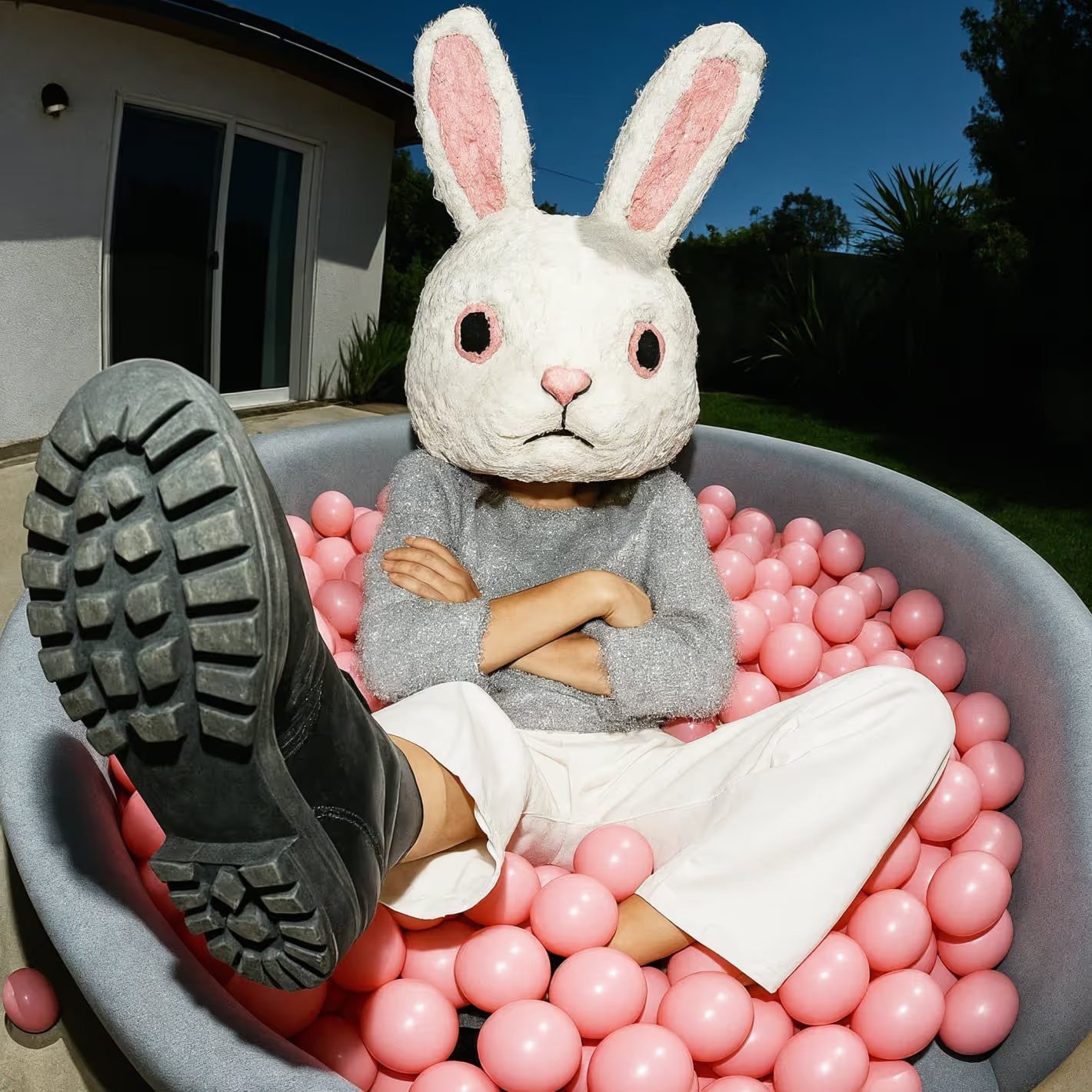
Branded Since Birth

With algorithmic parenting and branded childhoods the modern-day norm, it was only a matter of time before the unpaid headliners of family YouTube — the kids — started fighting back. But California beat them to it.
In early 2025, a TikTok video from momfluencer Brittany Xavier sparked a wave of backlash. In it, she’s calmly applying blush and explaining why she’s relocating from California to Tennessee. "We wanted land. We wanted a slower pace of life. We have friends here, and it’s a really good sense of community," she says.
The video was intended to be a chill life update, but it quickly became the latest entry in a growing online theory: family vloggers are fleeing California to avoid a new law that forces them to pay their kids.
The timing was suspicious. The vibes were off. And TikTok was all over it.
Act I: The Golden Age of Exploitation
If you grew up on YouTube, you probably watched a family vlog. You know the ones: carefully color-graded thumbnails, a kid in tears over a lost tooth, a new baby being introduced to the family like an unboxing video.
It was cute, until it wasn’t.
The family vlogging genre has always tiptoed on the edge of ethical disaster. For over a decade, parents have built entire empires on the backs of their children’s milestones. First steps. First periods. First heartbreaks. All filmed, uploaded, and monetized. At its peak, Piper Rockelle’s videos reportedly brought in half a million dollars a month, according to Netflix’s “Bad Influence: The Dark Side of Kidfluencing.”
YouTube made it easy. There were no studio rules, no work permits, and no set teachers. Just an iPhone, some editing software, and a child willing to cry on command — or worse, a parent willing to keep the camera rolling while their child fell apart.
And when that video paid the mortgage? Suddenly, tantrums became plot points. Suddenly, privacy became negotiable.
But behind the DIY polish and hyper-bright smiles, things took a dark turn. That same documentary chronicled allegations of emotional, physical, and even sexual abuse behind the scenes of Piper’s "Squad" — a group of child influencers overseen by Rockelle’s mother-slash-manager, Tiffany Smith. The suit, filed by 11 former Squad members, was settled for $1.85 million in 2024. There was no admission of guilt, but the damage was public.
As one former Squad parent told Vanity Fair: "It was a cult."

Act II: The Law that Launched a U-Haul Fleet
In 2024, California passed Senate Bill 764, effective January 1, 2025, telling parents, “Hey, if your kid is the reason you’re cashing YouTube checks, they deserve more than a Happy Meal.” Under the new rules, if a kid appears in 30% or more of a creator’s monetized content, [65% of those earnings have to be saved for them](https://sd18.senate.ca.gov/news/california-governor-signs-senator-padilla-bill-updating-financial-protections-youth-content#:~:text=Senate Bill 764 requires content,access when they reach adulthood.). It’s a modern remix of the Coogan Law, which has been protecting child actors from their stage moms since 1939. This time, it covers family vloggers, TikTok toddlers, and anyone else who’s been “accidentally” born into an online brand deal.
Governor Gavin Newsom even had Demi Lovato at the bill signing. That’s how seriously California wants you to take this.
But the law has teeth mostly in theory. As Taylor Lorenz pointed out in User Magazine, the trust requirement only applies to platform revenue (such as YouTube AdSense), not brand partnerships, which is where the real influencer money gets made. So, yes, you have to pay your kid their cut of the four dollars you made from a sponsored TikTok, but not the $40,000 you got from the diaper brand in the DMs.
What’s more, there’s almost no enforcement mechanism. Most creators don’t publicly report what their kids earn or how often they appear. And that’s assuming they consider their kids employees at all. Some creators dodge the law entirely by funneling brand revenue through personal LLCs, making it harder to pin down how much a child’s presence actually contributed to a campaign.
Monetization, in this world, is a shell game. One day it's a vlog. The next it's a skincare ad posted "as a mom." The kid is still in the video. The kid is still the draw. However, legally, the payment goes to the adult, and the law looks the other way.
Still, it spooked people. And that’s when the moving trucks started showing up.

Act III: Nashville, Where Branding Meets Baptism
First, it was the LaBrants. Then Cecily Bauchmann. Then, Brittany Xavier. All packed up and headed to Tennessee, a state with no income tax, cheap land, and plenty of space to start a farm or film an apology video.
Kristi Cook (@spillsesh_yt) told Rolling Stone, "It’s very interesting timing that a lot of them are family influencers or influencers that have kids at the same time that there has been this new law set in place."
And sure, it's not just the law. In interviews, families say they want to be closer to relatives, escape the L.A. rental crisis, or live somewhere that “aligns with their values”.
As Sheri LaBrant told Rolling Stone, the move had more to do with conservative values and Tennessee’s family-friendly vibes. That phrase — conservative values — has become a kind of catchall in influencer speak. It means God, tradition, homeschooling, denim skirts, Christian podcasts, and a firm belief that your personal choices should remain free from government interference.
What, exactly, is liberal about financial transparency? About making sure a six-year-old who made you a mortgage payment gets a portion of that money? The idea that a child’s trust fund is somehow part of a radical leftist agenda is laughable — but it plays well to audiences already primed to distrust California, regulation, and any policy that treats social media as a real workplace.
So no, Sheri didn’t say they were running from SB 764. But when the explanation is “we just wanted a more wholesome lifestyle,” and the timing directly aligns with the new law, it’s hard not to read between the (state) lines.
There’s a broader migration pattern here, too — one that includes former tech founders, crypto bros, and now, Christian family influencers. Tennessee has quickly become the unofficial headquarters for right-leaning creator culture. Some call it “Hollywood for conservatives.” Others call it tax strategy in prairie skirts.

Act IV: The Backlash is Online
The minute influencers say it’s not about the law, TikTok calls bullshit.
Brittany Xavier's explanation, which included mentions of mold, fires, and farming, only made it worse. Nearly every top comment accuses her of running from accountability. One user summed it up: "You moved the SECOND the law passed. We’re not stupid."
The public's appetite for family influencer drama is now insatiable, but it's also morally charged. It’s no longer just cringe to film your kid’s tantrum for views; it’s rather sinister.
The backlash is generational. Younger audiences, especially Gen Z, have grown increasingly critical of parasocial parenting and influencer kids. What millennials thought was "just sharing our lives" now reads as exploitation, plain and simple.
And the kids are starting to talk. Shari Franke, daughter of Mormon vlogger Ruby Franke (currently serving 30 years for child abuse), released a memoir this year called “House of My Mother.” In it, she describes a family dynamic where the camera was always rolling and the emotions were never real. "Cut, and the next clip would be: We’re happy again."
She’s not alone. TikTok is now full of creators who once starred in family content, speaking out about their experiences.
In a Cosmopolitan Australia article, a former child influencer named Vanessa recounted her experience of being featured in her mother's blog and social media content throughout her childhood. She described the pressure to maintain a perfect image and the lack of autonomy over her own life. Vanessa said, “Sometimes I didn’t know where the separation was between what was real and what was curated for social media.”
Similarly, Cam Barrett, known on TikTok as @softscorpio, testified before Maryland legislators about the impact of being overshared online during their youth. Cam shared that their mother posted intimate details of their life without consent, leading to anxiety and a desire to reclaim their narrative. “As a former content kid myself, I know what it's like to grow up with a digital footprint I never asked for.”

Act V: What Counts as Consent When You're Five?
Can a child meaningfully agree to broadcast their life — every scraped knee, every birthday, every meltdown — to millions of strangers for the sake of ad revenue?
Meaningfully, as in: beyond "Mom said it’s fine" and "I get ice cream after."
And what happens when they grow up?
The kids from Eight Passengers and the Squad are just a few of the former child stars starting to share their perspectives. Many feel used. Some feel traumatized. Others don’t even remember what parts of their childhood were real and which were scripted for content.
There’s a broader cultural shift happening, too. As family vloggers hit peak visibility, a growing wave of former “content kids” are speaking out, joining advocacy groups like Quit Clicking Kids, and calling for more states to adopt California-style laws. Utah, long home to a large number of Mormon family vloggers, faced legislative pressure from the very children once filmed in matching Sunday bests, and House Bill 322 takes effect May 7, 2025.
Some of these kids have become activists. Others have vanished from the internet entirely, trying to reclaim what little privacy remains. A few have even launched their own channels, documenting the process of healing from childhoods affected by the internet at this scale.
Act VI: The Content House that Broke the Internet
Enter: The Sweet Sisterhood — a newly formed content house featuring girls as young as 8, curated by their influencer moms to produce branded TikTok, YouTube, and Instagram content for millions of followers.
In a viral YouTube critique, creator Isabella Lanter voiced the growing unease: “These kids are not living normal lives. Their lives are surrounded by content, by performance, by what will do well with an audience. It’s not childhood…it’s production.”
The Sweet Sisterhood describes itself as a “girl-powered” content collective, designed to “inspire others”. However, critics argue that its young members appear to be scripted, carefully styled, and encouraged to speak directly to the camera as if they were 28-year-old life coaches, instead of kids still losing their baby teeth.
Why should a 9-year-old be responsible for inspiring other kids? Why should an 11-year-old have a fan base? Why are parents uploading get-ready-with-me videos for children with captions like “confidence is my superpower” while their kids are watched, saved, and commented on by total strangers?
The safety risks are quicksand dressed up as a sandbox. And the kids are being taught to call it home.
They don’t know about stranger danger, because the strangers are subscribers. Fans. Followers. “Supporters.”
Their lives are so alarmingly public that someone could shout their name in a grocery store, and they’d instinctively smile and wave. They’re used to being seen. Recognized. Remembered. Their favorite candy? You know it. Their shoe size? You’ve seen it. Their mom just posted it in a back-to-school try-on haul. You know what time they go to dance class, what street their grandma lives on, and which beach they visit every July. These are breadcrumbs for anyone watching closely enough.
And people are watching. Some with innocent intent. Some… not so much. The comments say it all — hundreds of heart emojis, “so cute” replies, and the far darker, often deleted ones that still get screen-capped and passed around.
“A child having a platform this big is weird. I think it’s creepy,” Isabella said. “You are practically handing [pedophiles] content.”
This is about identity formation built on the feedback loop of likes, follows, and algorithmic applause. This is about kids who grow up seeing their worth reflected in engagement metrics and don’t know who they are when the views stop coming.
It’s destabilizing. And it’s happening in real time, to kids too young to consent and too trusting to question why they’re famous.

End Scene: The Law That Might Not Matter
Is the law working? It could be, symbolically.
It signals that kids are not content machines. It acknowledges that childhood shouldn’t get monetized without protection. And it’s already inspired similar efforts in Utah and other states.
It doesn’t matter if every loophole remains intact or if influencers pivot to filming from a farm instead of a townhouse. What matters is that we’re finally asking the right questions:
- Why does a toddler need a personal brand?
- Who gets to profit from a child’s pain?
- What happens to a kid when the camera never turns off?
But like all legislation trying to keep up with the internet, it’s too slow, too narrow, too polite. The money is still flowing. The ring lights are still glowing.
So maybe the real enforcement isn’t legal. It’s cultural.
TikTok commenters are the new regulators. Ex-vlogger kids are the new whistleblowers. And viewers, for the first time in a decade, are starting to hit the unfollow button.
What happens next? More states are likely to follow California and Utah’s lead, but don’t expect it to happen quickly. Until then, creators might begin hiding their kids from the camera (only to feature their voices or the backs of their heads). Some may spin off “clean” content accounts while continuing to monetize the family in subtler ways.
And brands? They’ll keep working with whoever delivers engagement — unless viewers demand ethics with their unboxing hauls.
Can 2025 be the year we stop celebrating the exploitation of children?
It should be. But even if it’s not — this time, we’ve got the footage.



© 2026 Manychat, Inc.

